

Your Employees Want the Negative Feedback You Hate to Give. Would you rather hear positive feedback about your performance or suggestions for improvement?

For the last two weeks, we’ve been compiling data on this question, and on people’s general attitudes toward feedback, both positive and corrective. So far we’ve collected it from 899 individuals, 49% from the U.S. and the remainder from abroad. Before we tell you what we found, we suggest you take the same assessement here so you can put our findings within your own personal context. What our assessment measures is the extent to which you prefer to give and to receive both positive and corrective feedback. It also measures your level of self-confidence. The graph below shows, on average, the degree to which the participants in our initial sample tend to avoid or prefer giving and receiving positive and corrective feedback. #.U76OTk0wV18. Contributor: Diana DavisPosted: 07/08/2014 12:00:00 AM EDT Rate this Article: (4.0 Stars | 6 Votes) Every industry has its own particular jargon and terminology that can baffle and befuddle outsiders.

Whether you love it or hate it, here are a few of the terms that often pop up in process excellence that even process initiates love to hate: #1: Anything Japanese When Lean and Six Sigma came to the fore in the 1980’s, the world was in the love with the Japanese economy. cAValryRides sur Twitter : "Innovation...@despairinc style... Managing and Motivating Employees in Their Twenties - Michael Fertik - The Conversation. By Michael Fertik | 3:10 PM January 19, 2011 I’ve been lucky to work with some awesome employees in their twenties.
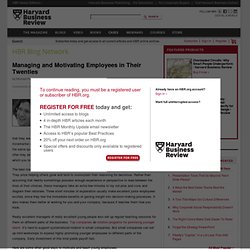
While that formative decade is long and dynamic for each person; in a companion post I’ve offered some observations on the differences between Generation Z and Generation After-Lehman; there are some consistencies in how best to manage and motivate excellent twenty-somethings. Younger people are especially hungry both to learn and to receive affirmation that they are doing a good job. I’ve found the best ones are generally much more motivated by incremental education and acknowledgement than they are by a modest bump in salary. Of course, the same qualities that make younger colleagues so responsive to the education and praise you offer may also make them susceptible to negative feedback loops, so be mindful of the context into which you toss them. The best managers of younger employees are people who would otherwise love teaching for a living. Ask frequent questions. The Critical Role of Team Leader.
In my book, The Secret of Teams, I advocate for a higher form of team – a high performance team.
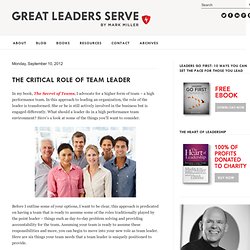
In this approach to leading an organization, the role of the leader is transformed. She or he is still actively involved in the business but is engaged differently. What should a leader do in a high performance team environment? 5 Steps to Creating the World's Greatest Workplace - Vishen Lakhiani of Mindvalley. WOBI how to sustain Teamwork. Steve Jobs talks about managing people. The Steve Jobs MBA. 11 Important Life Lessons To Learn From Steve Jobs. By Celes on Oct 7, 2011 | ShareThis Email This Post Yesterday morning, I was busy writing the preparation post for upcoming 21-Day Meditation Challenge (Which is now up: 21DMC, Day 0 – Preparation.
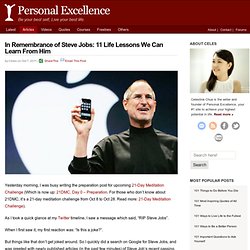
LEAN. DISC Model. Inspire everyone. Customer experience. Kommentar: Hören Sie nicht auf Einzelne! - Harvard Business Mana. Führungskräfte glauben nur allzu gern, was ihnen Einzelpersonen raten.

Dabei täten sie besser daran, die Weisheit der Vielen zu nutzen. Wer das Verhalten von Gruppen studiert, kann fundiertere Entscheidungen treffen. Von Michael J. Mauboussin HBM Januar 2010. Dear Colleague, Put the Notebook Down - Alexandra Samuel. How (And When) to Motivate Yourself - Peter Bregman - Harvard Bu. By Peter Bregman | 9:00 AM May 5, 2010.
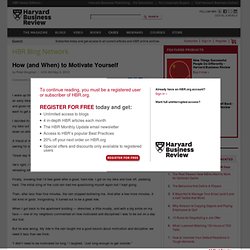
RSA Animate - Drive: The surprising truth about what motivates us. How to Manage Smart People. <A HREF=" Widgets</A> Issue 13 | How to Manage Smart People By Scott BerkunPublished Feb. 8, 2005 4:00 p.m.
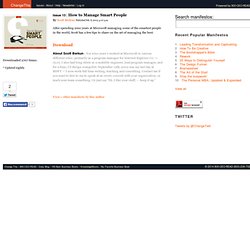
After spending nine years at Microsoft managing some of the smartest people in the world, Scott has a few tips to share on the art of managing the best. Download About Scott Berkun | For nine years I worked at Microsoft in various different roles: primarily as a program manager for Internet Explorer (v1 -> v5.0). I also had long stints as a usability engineer, lead program manager, and for a time, UI design evangelist. View 1 other manifesto by this author Request Processed. The 25 most difficult questions. If you are one of those executive types unhappy at your present post and embarking on a New Year's resolution to find a new one, here's a helping hand.

The job interview is considered to be the most critical aspect of every expedition that brings you face-to- face with the future boss. One must prepare for it with the same tenacity and quickness as one does for a fencing tournament or a chess match. This article has been excerpted from "PARTING COMPANY: How to Survive the Loss of a Job and Find Another Successfully" by William J. Morin and James C. 12 Things Highly Productive People Do Differently. How To Talk About Your Weaknesses. It’s hard enough that we have to talk about our strengths to others, but our weaknesses?

That’s just the worst. Even more confounding, we’re only asked to talk about our weaknesses and our strengths in an interview, but after we get the job, we’re rarely ever asked to talk about what makes us so great again.